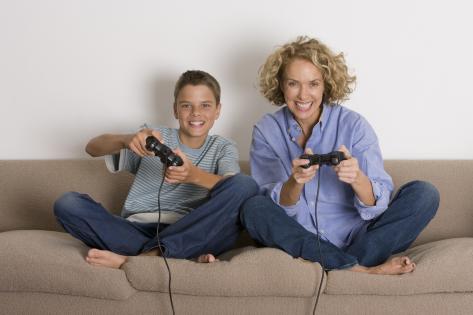Playing video games as a family can help build stronger relationships with your children according to Dr Daniel Johnson of QUT’s Games Research and Interaction Design Lab.
Dr Johnson and his gaming research group at the Young and Well Cooperative Research Centre (CRC) combed through 200 papers and reports from around the world to find out when and how video games can have a positive effect on the wellbeing of young players.
They discovered that the types of video games a young person plays is less important for their wellbeing than how they play videogames - and who they play them with.
Their research challenges the belief that video games breed socially isolated, aggressive and lazy teenagers.
"Our research showed that playing video games can improve a young person's mood, help them reduce their stress levels, and promote feelings of competence and autonomy," said Dr Johnson, from QUT's Science and Engineering Faculty.
"Playing video games with others in particular increases a person's brain activity, improves their social wellbeing and helps them feel more connected with others.
"If you're trying to reach out to the teenager in your house, spending time with them playing a cooperative video game you both enjoy could be the bridge you're looking for - and you'll likely feel the same positive impacts on your wellbeing, too."
Overall, his team's research found:
- moderate (non-excessive) levels of playing are associated with positive emotions and improved mood, improved emotion regulation and emotional stability and the reduction of emotional disturbances
- playing video games can be a healthy means of relaxation, stress reduction and socialising, and
- people who play video games in moderation have been shown to have significantly less depressed mood and higher self-esteem compared to those who don't play or who play excessively.
More than 95% of Australian homes with children aged under 18 have one or more devices for playing video games.
"One of the most important things you can do as a parent is to ensure you and your child engage thoughtfully with what you are playing," Dr Johnson said.
"Look for games that encourage creativity and cooperation and that are age-appropriate."
Dr Johnson also cautioned that excessive or obsessive video game play and technology use was not good for mental health as this could lead to negative outcomes such as anxiety and insomnia.
He said his team's future research will in part focus on what constitutes a healthy or moderate amount of play for people at different ages and how best to leverage the wellbeing benefits of video games in a therapeutic setting.


















__small.png)










